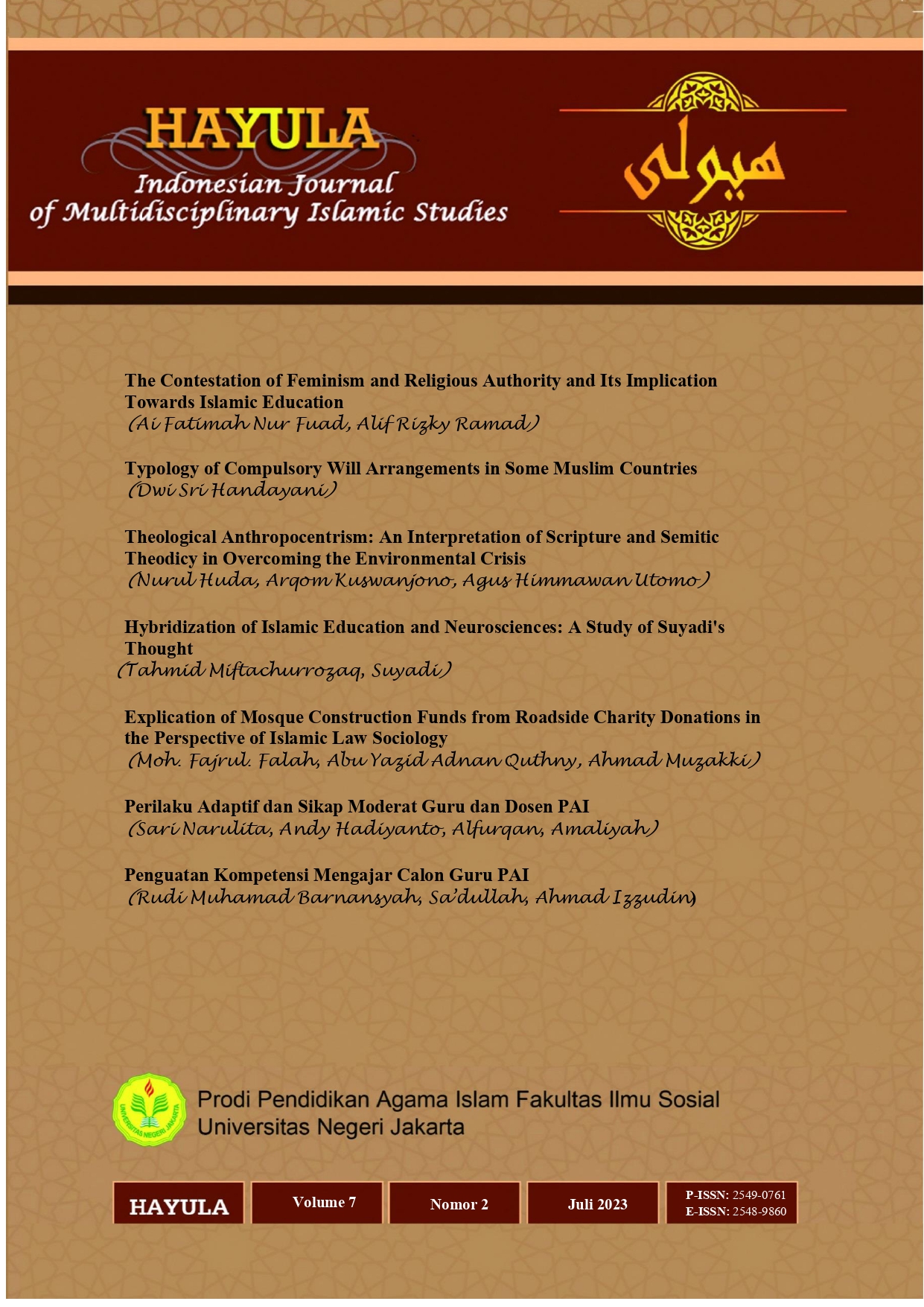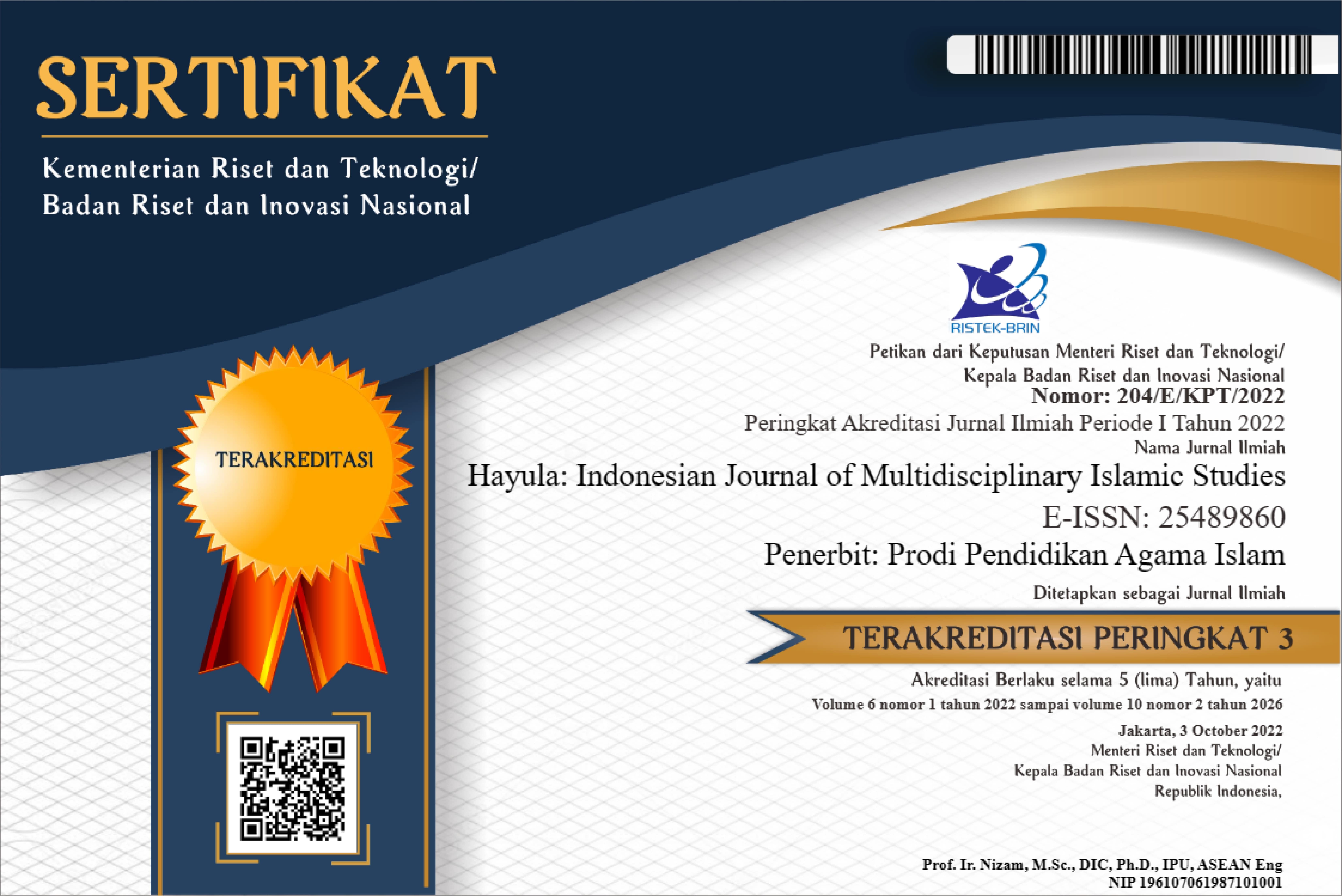Explication of Mosque Construction Funds from Roadside Charity Donations in the Perspective of Islamic Law Sociology
DOI:
https://doi.org/10.21009/hayula.007.02.05Keywords:
Masyarakat Pakuniran, Donasi pinggir jalan, Hukum-IslamAbstract
This study aimed to determine the characteristics of religiosity, sociology, psychology in the controversy over mosque construction funds from roadside donations made by the people of Pakuniran District. Madura Indonesia The research method uses qualitative and ethnographic approaches, structural-functional theory, and Islamic law (IL). Ethnography is a concept of actualizing cultural aspects. Meanwhile, Talcott Parson's structural-functional theory from a socio-anthropological perspective aims to interpret society, religion and government in a linked structure. The perspective of Islamic law (IL) is a series of shari'ah of Allah Subhanahu Wa-ta'ala which is the fundamental reference for Muslims and mujtahidin in giving fatwas. So that ethnography, structural-functional, and Islamic law (IL) form a triangular methodology, which becomes a data collection and analysis technique. Results The researcher describes the perspective of roadside donation activities by formulating three fundamental data: (a) Ethnographic perspective related to roadside donation activities. (b) Structural-functional community according to the context of Talcott Parson. (c) The conformity of Islamic law (IL) to roadside charities. This study identifies the phenomenon of the Pakuniran community according to context, thereby triangulating the contradictory results between community activities and the perspective of Islamic Law (IL).
References
education research (pp. 279-295). Routledge. https://doi.org/10.4324/9780203874769
Al-Bukhari, M. (2001). Al-Jami ‘al-Musnad al-Sahih al-Mukhtasar min Umur Rasulullah
SAW wa Sunanihi wa Ayyamihi–Sahih al-Bukhari.
Ali, Z. (2008). Sosiologi Hukum, cetakan ke 4. Jakarta: Sinar Grafika, hlm, 13-15.
Al-Maliki, M.A., & Mustaqim, A. (2003). Syariat Islam: pengumpulan teks dan realitas.
ALSAQ Press.
Al-Qurtubi, A.A. M.B., & al-Ansari, A. (1967). Al-Jami’li Ahkam Al-Qur’an, jilid II.
Kairo: Dar al-Kitab al-Arabi
Al-Zuhayli, W. (1998). Usul al-Fiqh al-Islami, juz. 2. Damsyik: Dar al-Fikr.
Björnsson, G. (2012). Do ‘objectivist’features of moral discourse and thinking support moral objectivism? The Journal of Ethics, 367-393.https://doi.org/10.1007/s10892-012-9131-9
Burchardt, M., & Westendorp, M. (2018). The im-materiality of urban religion: towards
an ethnography of urban religious aspirations. Culture and religion, 19(2), 160-176. https://doi.org/10.1080/14755610.2018.1444656
Crăciun, M., & Lipan, Ș. (2020). Introduction: The middle class in post-socialist Europe:
Ethnographies of its “good life”. East European Politics and Societies, 34(2), 423-440. https://doi.org/10.1177/0888325420902509
Creswell, J.W. (2012). Educational research: planning. Conducting, and Evaluating, 260, 375-382.
Creswell, J.W., & Creswell, J.D. (2017). Research design: Qualitative, quantitative, and
mixed methods approaches. Sage publications.
Creswell, J.W., & Poth, C.N. (2016). Qualitative inquiry and research design: Choosing
among five approaches. Sage publications.
Dahlan, A. (2011). Rahman, Ushul Fiqh. Jakarta: Amzah.
Dahrendorf, R. (1968). Essays. In the Theory of Society. Routledge.
https://doi.org/10.4324/9781003260271
Dawson, J. (2018). “Everyday Democracy”: an ethnographic methodology for the evaluation of (de-) democratisation. East European Politics, 34(3), 297-316. https://doi.org/10.1080/21599165.2018.1482213
Duranti, A. (2012). Anthropology and linguistics. The SAGE handbook of social anthropology, 1, 12-26.
Effendi, M. R., Wajdi, F., Mardhiah, I., Salsabila, N. F., & Joan, N. A. (2022). Penguatan Nilai-Nilai Profetik Masyarakat Desa Cisaat dalam Kegiatan Pendidikan Keagamaan Melalui Program Muslim Friendly Tourism. Sivitas: Jurnal Pengabdian dan Pemberdayaan Masyarakat, 2(2), 47-58.
Elliott, J. (2013). SAGE Research methods SAGE biographical research. Sage. https://dx.doi.org/10.1177/1468794106093637
Fetterman, D.M. (2019). Ethnography: Step-by-step. Sage publications.
Fetterman, D.M., & Pitman, M.A. (1986). Educational evaluation: Ethnography in theory, practice, and politics. Sage Publications/Corwin Press, 2455 Teller Rd., Newbury Park, CA 91320.
Guetterman, T.C., & Fetters, M.D. (2018). Two methodological approaches to the integration of mixed methods and case study designs: A systematic review. American Behavioral Scientist, 62(7), 900-918. https://doi.org/10.1177/0002764218772641
Hakim, A.H., & Musadad, A. (2021). Mengenal dasar-dasar ilmu ushul fiqh dan kaidah fiqh, terjemah Mabadi Awwaliyah. CV Literasi Nusantara Abadi
Hakiem, M.L., Kesuma, Y., & Muhajir, A.R. (2004). Syari'ah sosial: menuju revolusi kultural. Penerbitan Universitas Muhammadiyah Malang.
Hamati-Ataya, I. (2014). Transcending objectivism, subjectivism, and the knowledge in-between: the subject in/of ‘strong reflexivity’. Review of International Studies, 40(1), 153-175. https://doi.org/10.1017/S0260210513000041
Harris, M. (2001). Cultural materialism: The struggle for a science of culture. AltaMira Press
Heidegger, M (2008). Towards the Definition of philosophy: The idea of philosophy and the problem of world view, phenomenology and transcendental philosophy of value, translated from Germany (1919) by Sadler, T (2008). Continuum, London.
Heiphetz, L., & Young, L.L. (2017). Can only one person be right? The development of objectivism and social preferences regarding widely shared and controversial moral beliefs. Cognition, 167, 78-90. https://doi.org/10.1016/j.cognition.2016.05.014
Husserl, Edmund (1964). The phenomenology of internal time consciousness, translated from Germany Edition (1905) by Churchill, James S. (1964). Indiana University Press.
Husserl, E. (1970). The crisis of European sciences and transcendental phenomenology: An introduction to phenomenological philosophy. Northwestern University Press.
Johnson, D.P. (1986). Teori sosiologi klasik dan modern, jilid 2. Jakarta: PT.
Johnson, R.B., & Christensen, L. (2019). Educational research: Quantitative, qualitative, and mixed approaches. Sage publications.
Kahmad, D. (2006). Sosiologi Agama, cetakan 4. Bandung: Remadja Rosdakarya.
Kholilah, K., & Astuti, R. (2021). Pembentukan karakter kedermawanan anak melalui kegiatan jum’at beramal di raudhatul athfal al-firdaus pamekasan. Islamic EduKids: Jurnal Pendidikan Anak Usia Dini, 3(2), 26-39. https://doi.org/10.20414/iek.v3i2.4679
Kluckhohn, C. (2017). Mirror for man: The relation of anthropology to modern life. Routledge. https://doi.org/10.4324/9781315107127
Lee, Y.K., Choi, J., Moon, B.Y., & Babin, B.J. (2014). Codes of ethics, corporate philanthropy, and employee responses. International Journal of Hospitality Management, 39, 97-106. https://doi.org/10.1016/j.ijhm.2014.02.005
MacLeod, A.K. (2015). Well-being: Objectivism, subjectivism or subjectivism? Journal of Happiness Studies, 16, 1073-1089. https://doi.org/10.1007/s10902-014-9561-0
Manzur, I. Muhammad bin Mukrim bin Munjir Al-Afriqi Al-Misri. nd Lisan al-Arab.
May, S.A. (1997). Critical ethnography. Encyclopedia of language and education: Research methods in language and education. https://doi.org/10.1007/978-94-011-4535-0_19
Megawati, S., Niswah, F., Mahdiannur, M.A., & Segara, N.B. (2022). AGIL scheme as social system to build characters caring for the environment through the Adiwiyata program. In IOP Conference Series: Earth and Environmental Science (Vol. 950, No. 1, p. 012070). IOP Publishing. https://doi.org/10.1088/1755-1315/950/1/012070
Merleau-Ponty, M. (1962). Phenomenology of perception: Translated from the French by Colin Smith. Humanities Press.
Miles, M.B., Huberman, A.M., & Saldana, J. (2013). Tactics for generating meaning. Qualitative data analysis: A methods sourcebook, 277-293.
Muslim, I. (1825). Al-Jami al-Shahih al-Muslim. Mesir: Mustafa al Halabi wa al Awladuh, J. III, 1348.
Nasikun, J. (1987). Sistem Sosial Indonesia, cet. ketiga. Radjawali, Jakarta.
Negoro, P.S. (2015). Komersialisasi Kotak Amal (Doctoral dissertation, Universitas Gadjah Mada).
O’Donoghue, T. (2018). Planning your qualitative research thesis and project: An introduction to interpretivist research in education and the social sciences. Routledge. https://doi.org/10.4324/9781351165563
Parsons, T. (1990). Talcot Parsons dan pemikirannya: Sebuah pengantar. Di Indonesiakan oleh Hartono Hadikusumo. Yogyakarta: PT Tiara Wacana.
Parsons, T. (2017a). The school class as a social system: Some of its functions in American society. In Exploring Education (pp. 151-164). Routledge. https://doi.org/10.4324/9781315408545
Parsons, T. (2017b). The law and social control. In the Sociology of Law (pp. 334-338). Routledge. https://doi.org/10.4324/9781315135069
Parsons, T., & Shils, E.A. (2017). The social system. In Toward a general theory of action (pp. 190-233). Routledge. https://doi.org/10.4324/9781351301527
Perdue, W.D. (1986). Sociological theory. Palo Alto.
Poloma, M.M. (2010). Sosiologi Kontemporer, terjemahan Yasogama. Jakarta: Rajawali Pers.
Pölzler, T., & Wright, J.C. (2019). Empirical research on folk moral objectivism. Philosophy compass, 14(5), e12589. https://doi.org/10.1111/phc3.12589
Rakova, O., & Fedorenko, O. (2021). Sticky notes against corporate hierarchies in South Korea: An ethnography of workplace collaboration and design co-creation. Design Studies, 76, 101033. https://doi.org/10.1016/j.destud.2021.101033
Ricoeur, Paul. (1978). The Philosophy of Paul Ricoeur: An Anthology of His Work. Boston: Beacon Press
Ricoeur, Paul. (1982). Hermeneutics and the human sciences: Essays on language, action and interpretation. Cambridge, London: Cambridge University Press.
Ritzer, G. (2014). Sosiologi ilmu berparadigma ganda (terjemahan Ali Ramdani).
Rusyd, I. Al-Muqaddimah. Tt, Kitab al-Bay’, juz II. Beirut: Dar al-Fukr.
Saifuddin, A.F. (2015). Logika antropologi suatu percakapan (Imajiner) mengenai dasar paradigma. Kencana.
Schutz, Alfred (1970). On phenomenology and social relations, edited by Wagner Helmut R. The University of Chicago Press, Chicago.
Spradley, J.P. (2016). The ethnographic interview. Waveland Press.
Strandberg, P.E. (2019). Ethical interviews in software engineering. In 2019 ACM/IEEE International Symposium on Empirical Software Engineering and Measurement (ESEM) (pp. 1-11). IEEE. https://doi.org/10.1109/ESEM.2019.8870192
Sudaryono. (2012). Fenomenologi Sebagai Epistemologi Baru Dalam Perencanaan Kota Dan Permukiman. Pidato Pengukuhan Jabatan Guru Besar Pada Fakultas Teknik Universitas Gadjah Mada, 1–25.
Syarifudin, H.A. (2014). Ushul Fiqih Jilid II (Vol. 2). Prenada Media.
Syāṭibī, A. I.A. (1997). Al-Muwāfaqāt fī Uṣūl al-Syarī’ah. Juz IV. Beirut: Dār al-Kutub al-’Ilmiyyah.
Van den Berghe, P. (1967). Dialectic and Functionalism: Toward a Synthesis, dalam NJ Demerath III et. al. eds., System, Change, and Conflict.
Van der Geest, S., & Finkler, K. (2004). Hospital ethnography: introduction. Social science & medicine, 59(10), 1995-2001. https://doi.org/10.1177/14661380022230679
Van Maanen, J. (2006). Ethnography then and now. Qualitative Research in Organizations and Management: An International Journal, 1(1), 13-21. https://doi.org/10.1108/17465640610666615
Vanderstraeten, R. (2013). Talcott Parsons and the enigma of secularization. European Journal of Social Theory, 16(1), 69-84. https://doi.org/10.1177/1368431012449236
Yin, R.K. (2013). Validity and generalization in future case study evaluations. Evaluation, 19(3), 321-332. https://doi.org/10.1177/1356389013497081
Zahrah, A. (1994). Ushul Fikih. Jakarta: Pustaka Firdaus.
Zahrah, M.A. (2007). Ushul Fiqih, alih bahasa oleh Saefullah Ma’shum, dkk. Jakarta: Pustaka Firdaus.
Zijlstra, L. (2019). Folk moral objectivism and its measurement. Journal of Experimental Social Psychology, 84, 103807. https://doi.org/10.1016/j.jesp.2019.04.005
Zionis, R.M. (2012). Ijtihad maqashidy perspektif Ahmad Al-Raysuni. Urwatul Wutsqo, 1(1).
Zuhayli, W. (1991). Al-tafsir Al-munir: Fi Al-'aqidah Wa Al-syariah Wa Al-manhaj. Darul Fikir.
Downloads
Published
How to Cite
Issue
Section
License
Authors who publish with this Journal agree to the following terms:
- Author retain copyright and grant the journal right of first publication with the work simultaneously licensed under a creative commons attribution licensethat allow others to share the work within an acknowledgement of the work’s authorship and initial publication of this journal.
- Authors are able to enter into separate, additional contractual arrangementfor the non-exclusive distribution of the journal’s published version of the work (e.g. acknowledgement of its initial publication in this journal).
- Authors are permitted and encouraged to post their work online(e.g. in institutional repositories or on their websites) prior to and during the submission process, as it can lead to productive exchanges, as well as earlier and greater citation of published works.
Users/public use of this website will be licensed to CC BY







